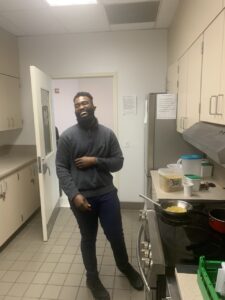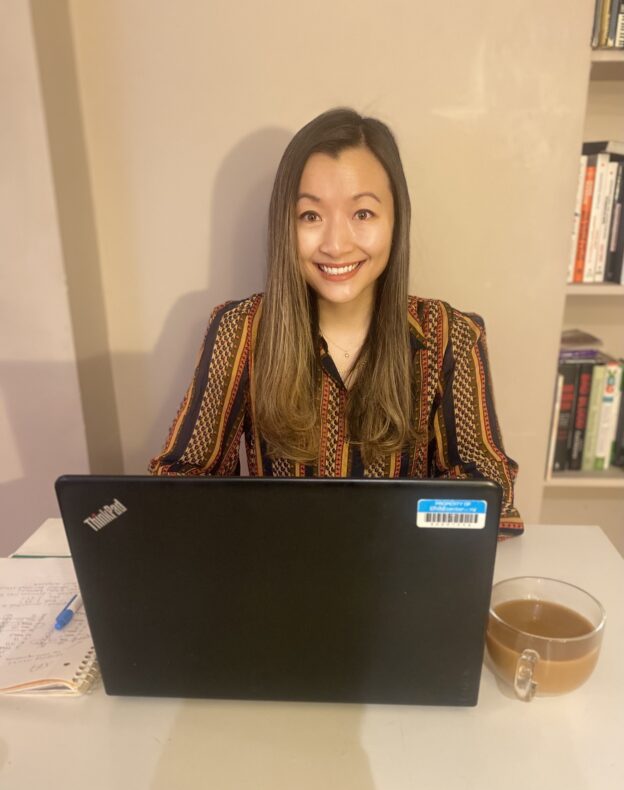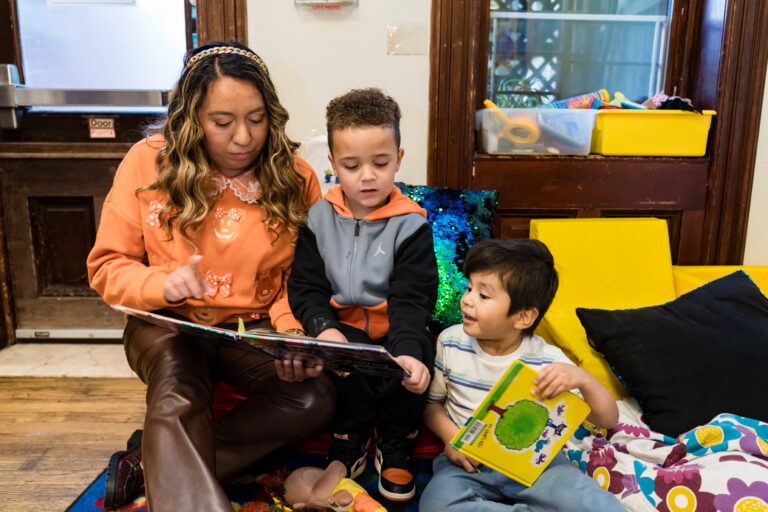By Traci Donnelly, Chief Executive Officer

Lead Clinical Coordinator Chrissie Chua conducts tele-therapy sessions with her clients during the COVID-19 pandemic.
At the beginning of the pandemic, the Governor’s office deemed The Child Center staff essential. That is in no small part because of our social workers and other service providers and support staff. They are essential to their clients, and to our community at large, and I can think of no better theme for Social Work Month 2021 than this year’s theme: Social Workers Are Essential.
The children and adults who come to The Child Center for mental health counseling do so for a variety of reasons. Some simply need support managing the overwhelming stresses of their everyday lives. Some face debilitating social determinants of health, like poverty or food insecurity, and they need not only therapy, but also practical help — like access to health insurance or SNAP benefits — as well. Some come to us for a substance use disorder. And some, of course, come to therapy having experienced trauma we wish no one had to go through.
Our social workers, supervising clinical coordinator social workers, mental health counselors, and other therapists help clients with all these things. You can see the difference this comprehensive and compassionate care makes to our clients, like Daniel and Leonard. And we saw it more clearly than ever during the upheaval of 2020.
At The Child Center, we saw the writing on the wall that February, and we did what we always do: We thought about how it would affect our clients and what we could do to help them. Together with our stellar social workers, service delivery staff, and Facilities team, we transitioned to tele-therapy without missing a beat, through HIPAA-compliant Chromebooks and other devices. Our social workers did this so quickly and efficiently that clients experienced no interruption of services — and our rate of broken appointments during this time actually decreased, from 24 percent to 15 percent.
Similarly, when we consolidated our South Jamaica and Jamaica clinics into one place — the Jamaica Family Wellness Center — we assessed how this move affected our clients by looking at how many clients we lost after the move. The result? We didn’t lose a single client. This stands as testament to the fact that the bond between a social worker and their client is strong and profound. When young people feel connected to their therapist, they make sure to continue their therapy, and continue working toward their goals.
In fact, not only did we avoid a decrease in the number of clients in therapy during 2020 — we expanded our reach. Over the summer, The Child Center took on a new program division, Residential Services (RS), for young people facing the toughest mental health and behavioral health challenges. Our first RS program is The Child Center Residential Treatment Facility (RTF), a warm and welcoming home for young people ages 12-18 who have had multiple unsuccessful psychiatric hospital placements or have been involved with the juvenile justice system. The clinical coordinators who work here never consider it too late to give young people the help they need, and they do everything they can to ensure they have the skills and support to achieve long-term success.
One RTF social worker, Elliott Hewett, commutes daily from Pennsylvania, continuing throughout the pandemic to meet with his clients in person, even through the winter’s biggest snowstorms. Part of the residents’ treatment involves helping them to solve problems without violence, but it’s a process, and Elliott doesn’t let it discourage him; he keeps showing up for these kids no matter what. One resident who had been at the facility for two years before The Child Center became the provider did not go to school at all or practice any self-care or hygiene. Her outbursts caused her to isolate herself from her peers and staff. Elliott set minor goals for her to accomplish at first. He then helped her to verbalize her emotions in an appropriate way. She’s now attending school daily, conscious about her hygiene, less prone to outbursts, and has made so much progress that she was able to leave the facility and rejoin the community.

Social Worker Rasheim Smith has continued to work on site throughout the pandemic.
From the early days of the pandemic, when many of us were able to retreat into the safety of our homes, another RTF social worker, Rasheim Smith, volunteered to come in early to help. He, too, had a dramatic effect on a resident who knew of no other way to express his feelings than physical aggression. After working with Rasheim, this young man’s aggression has decreased so much that he was able to go on his first home visit in three years, and his goal of family reunification is finally seeming possible.
Elliott, Rasheim, and the other social workers and staff at the RTF show up on Christmas and Thanksgiving and weekends. Their clients know they can count on them, and that’s what makes their progress possible. As Denise Buckley, SVP, Residential Services, puts it, “Working with young people, I learned they sometimes do not attempt to achieve something unless they believe it can be done. If they see that someone like them can do it — and that person believes in their ability — they are more inclined to try, and to succeed. That is what our social workers do: They provide an avenue for these young people to believe in and build a better future.”
This is also true at our school-based mental health clinics, where our social workers and mental health counselors continue to engage their clients and school community even when schools are closed. Under the direction of Lead Clinical Coordinator Chrissie Chua, our SBMH site at Long Island City High School has provided therapeutic services to about 80 students and 1,409 targeted services from July 1, 2020 through March 5, 2021.
“Chrissie provides interventions to a very challenging caseload of students,” explains Associate Vice President of Youth Development Kwan Wong. “Many present with depression, anxiety, and even suicidal ideations. Chrissie always makes herself available to the students and families she works with. Her clients are engaged and connected to Chrissie. With all the challenges and changes caused by COVID — schools going remote and the constant changes of schedules — Chrissie was able to adjust, adapt, and continue providing a high level of services to her students, as well as support to the entire LIC HS School community.”
The Child Center is blessed to have so many strong social workers, professionals who put their heart, soul, and considerable skills into their work and touch lives in the most profound ways. It is no exaggeration to say that what they do changes the trajectory of people’s lives, and they truly exemplify the meaning of “essential workers.”






